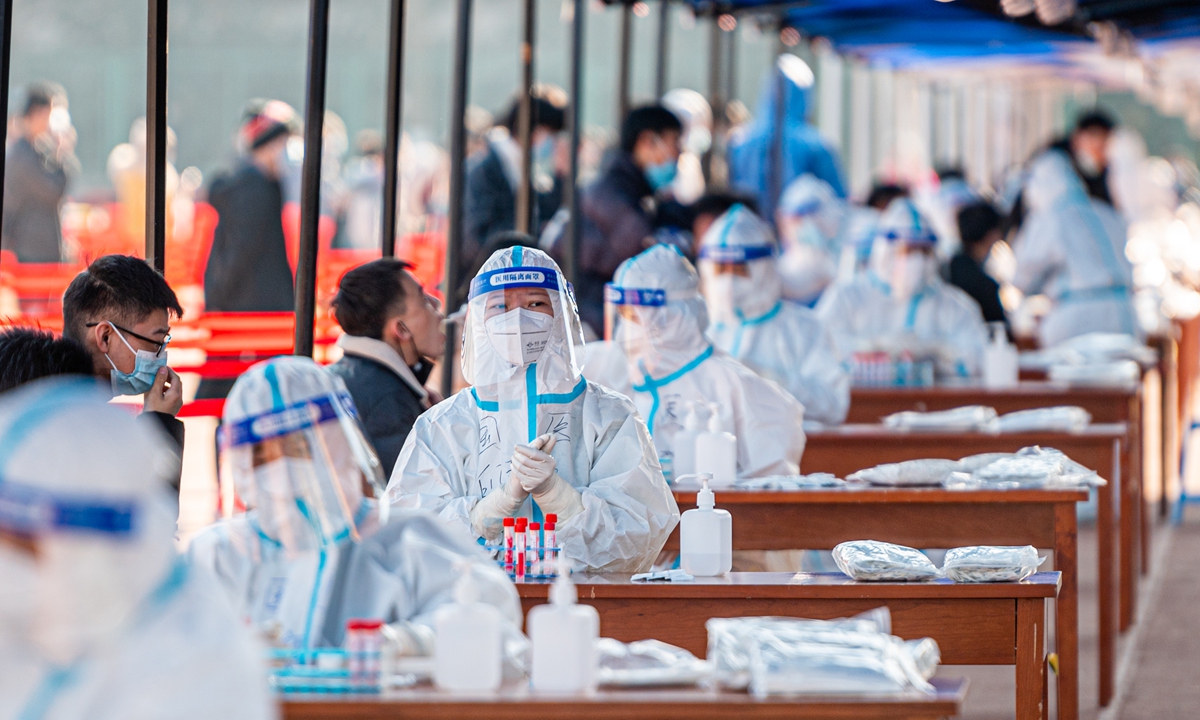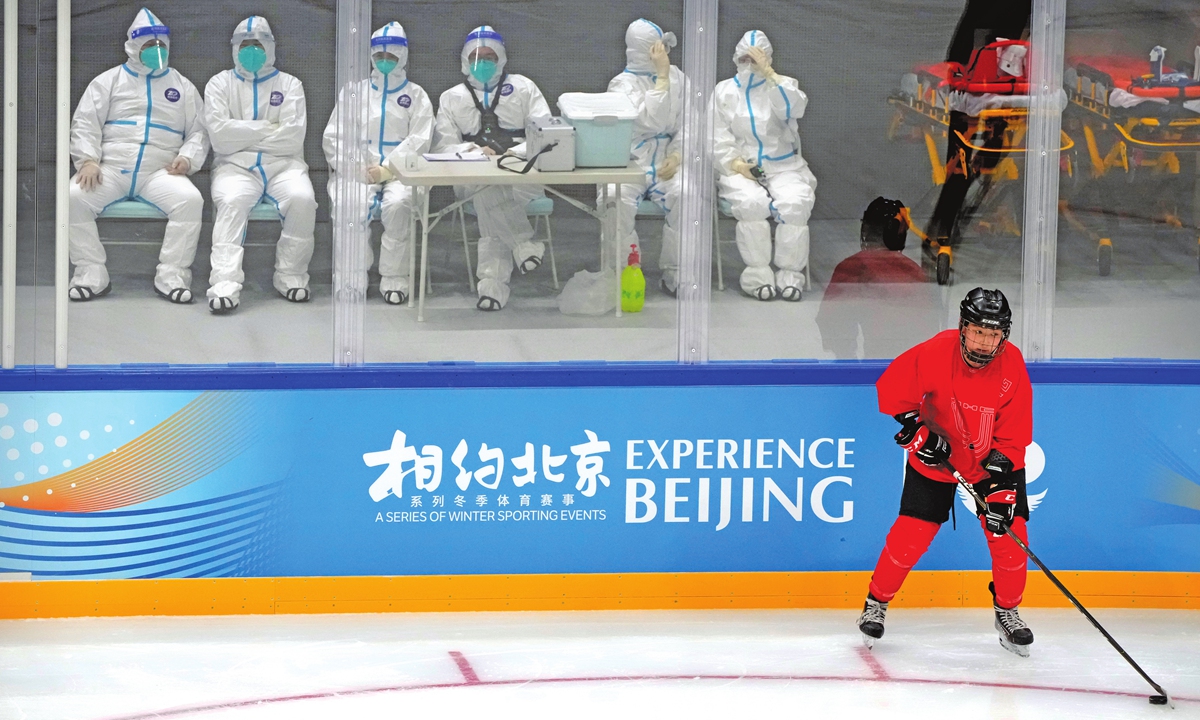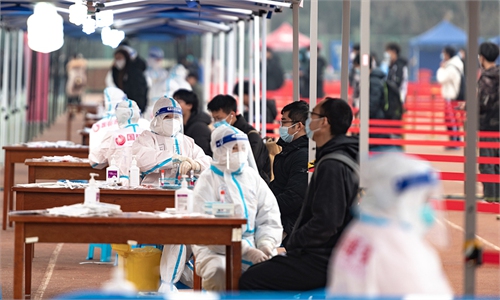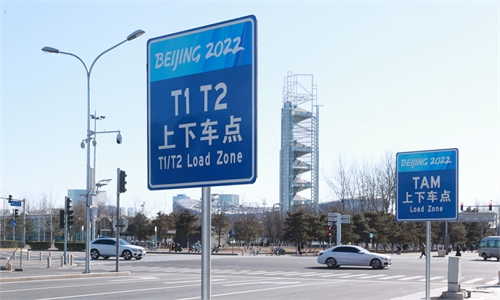China reports highest number of daily COVID cases in 20 months
Dynamic zero policy and closed-loop management will help ensure safe Beijing Olympics

Medical staff conduct nucleic acid tests at the Northwestern Polytechnical University in Xi'an, Northwest China's Shaanxi Province on December 21, 2021. Photo: VCG

Medical personnel in protective suits watch as the China Ice Sports College hockey team practices on the ice during the Experience Beijing Ice Hockey Domestic Test Activity, a test event for the 2022 Beijing Winter Olympics, at the National Indoor Stadium in Beijing, Wednesday, November 10, 2021. Photo: VCG
China reported 200 COVID-19 cases on Monday, with 162 domestic transmissions, the largest daily increases in almost 20 months. With concerns increasing over whether China can effectively put this round of flare-ups under control before the Beijing Winter Olympics in February, especially as the Omicron variant is causing havoc globally, analysts said that China's dynamic zero policy and previous experience in quelling domestic outbreaks will help curb the current epidemic, and the closed-loop management of the Beijing Olympics will ensure the safety of the sports event.
Among the 162 domestic cases, 150 were reported in Xi'an, capital of Northwest China's Shaanxi Province. From December 9 to the early morning of Monday, the total number of confirmed cases in Xi'an was 635, Zhang Bo, deputy director of Xi'an health commission, told a press conference on Monday.
Xi'an, home to 12 million people, started a new round of nucleic acid testing on Monday, and tightened its lockdown by requiring all of its residents to stay at home to guarantee the accuracy of the test results, according to the Monday press conference.
Xi'an has been in a citywide lockdown since Thursday, but each family could send one person outside once every two days to purchase daily necessities.
The outbreak in Xi'an has spread to many cities across China, including Dongguan, South China's Guangdong Province and Beijing, where the 2022 Winter Olympics will begin on February 4. Although this COVID-19 outbreak has increased the prevention pressure for China, Chinese health experts noted that China will ensure a safe international sports event since it can draw on lessons learned from previous experience in quelling local outbreaks.
Another concern is the global spread of the Omicron variant. The current anti-epidemic polices to guard the Beijing Winter Olympic Games have taken into full consideration of all possibilities, and the closed-loop management of people related to the Games will ensure they have no contact with the world outside of the closed loop, so the possibility of having COVID-19 is extremely low, Lu Hongzhou, head of the Third People's Hospital of Shenzhen and member of the expert committee of national disease control and prevention, told the Global Times on Monday.
Lu believes that no more extra anti-epidemic measures are required, as China's rich experience in handling the epidemic will protect the safety of the Games.
Beijing on Friday also announced to tighten epidemic prevention and control measures and vowed to strictly adhere to a dynamic zero policy as the New Year and the Spring Festival holidays approach. The Spring Festival falls on February 1, days before the opening of the Beijing Winter Olympics.
In response to concerns over whether the Omicron variant will affect China's prevention situation, Lu noted that although Omicron is highly contagious, as long as counter-epidemic measures are well implemented, the Beijing Winter Olympics should remain safe.
Wang Guangfa, a respiratory expert at Peking University First Hospital, told the Global Times that the arrival of foreign delegations will add to the pressure facing the capital in preventing imported cases in light of the Omicron storm in many countries.
Beijing may report cases during the Winter Olympics. However, with its experience of successfully quelling local outbreaks in the past year, the capital city will keep case numbers low, Wang said, noting that the high vaccination rate among Chinese people and Games participants will also help the prevention process.
As for international sports events, anti-epidemic measures that are strictly carried out are necessary, Aleksey Kurashev, president of the Russian Freestyle Skiing Federation, told the Global Times.
"The global pandemic situation forces such measures to be taken in order to maintain the safety of all participants," Kurashev said, noting that he has witnessed many previous tournaments that failed in this area. "Their maximum safety must be guaranteed, and the process should be objective and open."
"For the last two years at the World Cup stages, we came across situations where organizers were not prepared and operation of COVID-19 testing and the entire process raised serious concern," he noted.
"As participants, we hope the Beijing Winter Olympics will become the gold standard of objective judgment and fair sport play," said Kurashev, wishing the event every success.
The COVID-19 infections have surged in the US in recent days due to the highly transmissible variant Omicron, accounting for nearly three-quarters of US cases. Over the Christmas weekend, more than 45,000 flights around the world were canceled due to a mounting wave of infections driven by the variant, Reuters reported.






